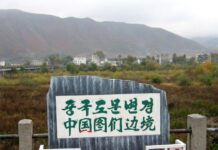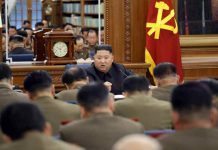Recent North Korean efforts to improve the water quality of Pyongyang’s Potong River seem to have garnered some success, Daily NK has learned.
“Now there is almost no smell when you walk by the Taedong or Potong rivers,” a source in Pyongyang told Daily NK yesterday. “Although exact figures on water quality improvement have not been disclosed, the conditions have improved a lot compared to the past.”
The United Nations Environment Programme (UNEP) and North Korea’s Ministry of Land and Environmental Protection conducted a joint investigation in 2012, concluding in a Climate Change Outlook Report that water pollution in major rivers, including Pyongyang’s Taedong River, was gradually growing more serious.
Then, when North Korean leader Kim Jong Un visited the construction site of luxury terrace houses by the Potong River last August and ordered that water quality in the river be improved, the issue of water purification quickly emerged as a “key national task.”
Soon after, scientists and engineers with the Science and Technology Committee, the Ministry of Urban Management, Kim Il Sung University, Pyongyang University of Architecture, and the Academy of Sciences were mobilized to purify the river’s water. Moreover, in October of last year, the Supreme People’s Assembly adopted a law against pollution of the Potong River as part of efforts to improve water quality.
Following efforts to clean up the Potong River, North Korea appears to have achieved some results, including the disappearance of stenches from the river.
North Korea’s Ministry of Social Security is also cracking down on the dumping of garbage in the river, the source said.
“Due to the strengthening of [COVID-19] emergency disease prevention measures, gathering by the river for amusement or entertainment has been prohibited,” the source said. “Civilian patrols affiliated with Pyongyang’s Ministry of Social Security have been organized to crack down on the littering of things like plastic and alcohol bottles, and other activities [that pollute] the Potong River.”
According to the source, North Koreans caught dumping garbage in the river will be fined KPW 50,000 to 100,000 (about USD 7.60 to 15.20), depending on the quantity. “So far, I’m not aware of any cases where people have received punishments other than being fined,” he added.
The source’s report suggests that because gatherings by the banks of the Potong River have been prohibited due to disease prevention measures, no one has been caught littering in the river.
Article 173 of North Korea’s Penal Code stipulates that a person who pollutes air, water, or soil in violation of the Environmental Protection Order shall be sentenced to forced labor for up to one year. If the violation is more serious, then the sentence will be up to three years at a forced labor facility.
The modernization or expansion of purification facilities may have also led to improved water quality on parts of the Potong River.
North Korea lacks water treatment facilities, and most water pollution is caused by the inflow of wastewater and residential sewage. The country’s purification facilities and wastewater treatment facilities are so dilapidated that residential sewage simply makes its way to rivers without going through a treatment process.
North Korea thus would face difficulties in producing noticeable changes in the water quality situation by conducting one-off water purification projects or simply cracking down on the inflow of waste.
North Korea’s recently passed anti-pollution law, which encourages organizations and companies around the Potong River to install modern sewage and wastewater purification facilities, may have also brought about improvements in the river’s water quality.
Translated by Gabriela Bernal
Please direct any comments or questions about this article to dailynkenglish@uni-media.net.



















